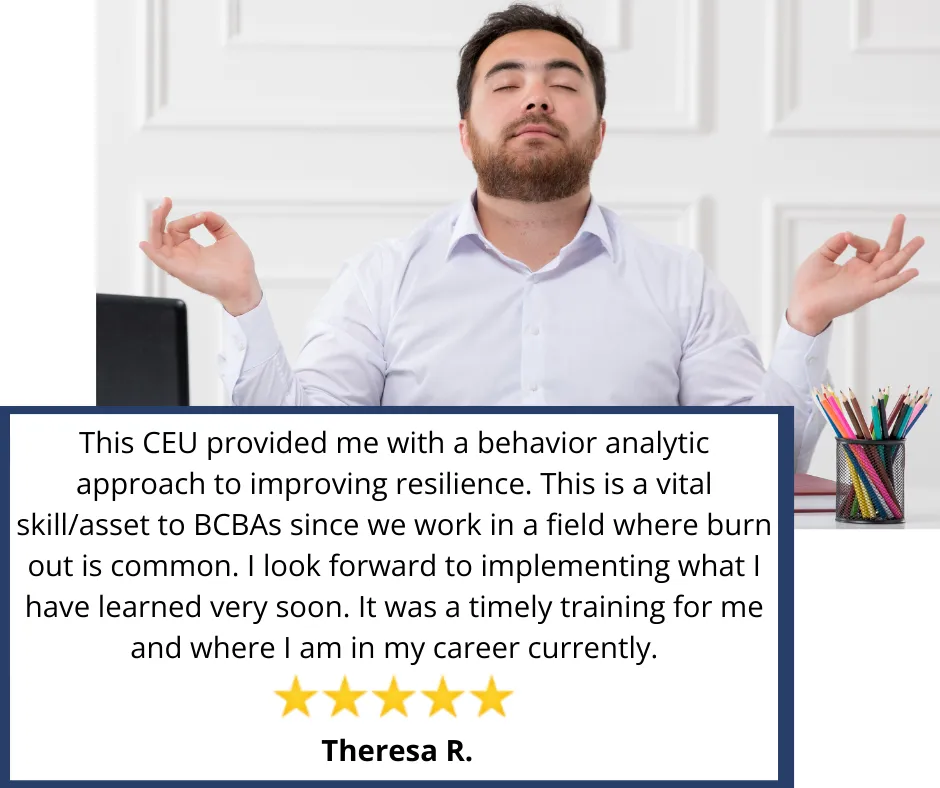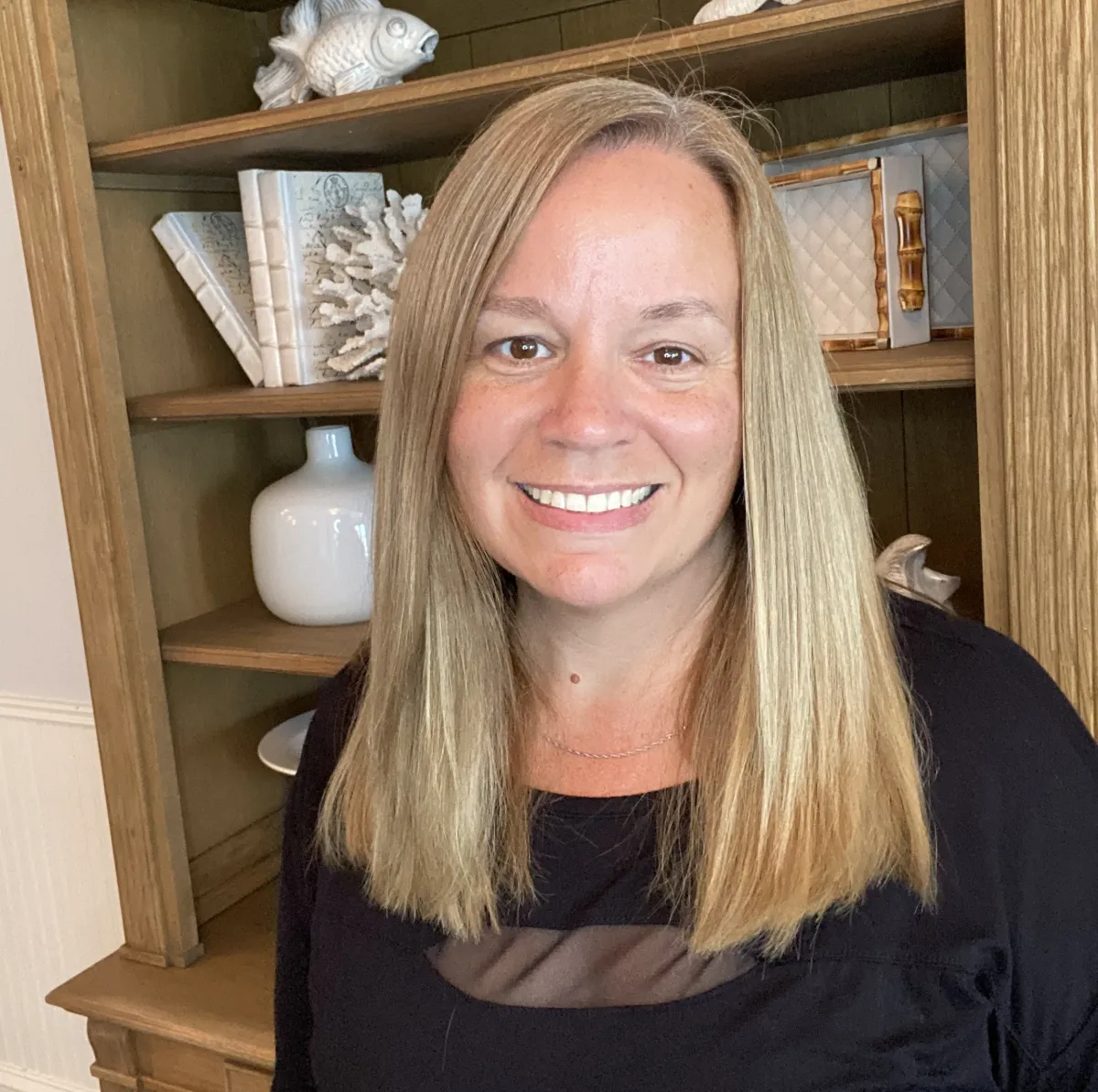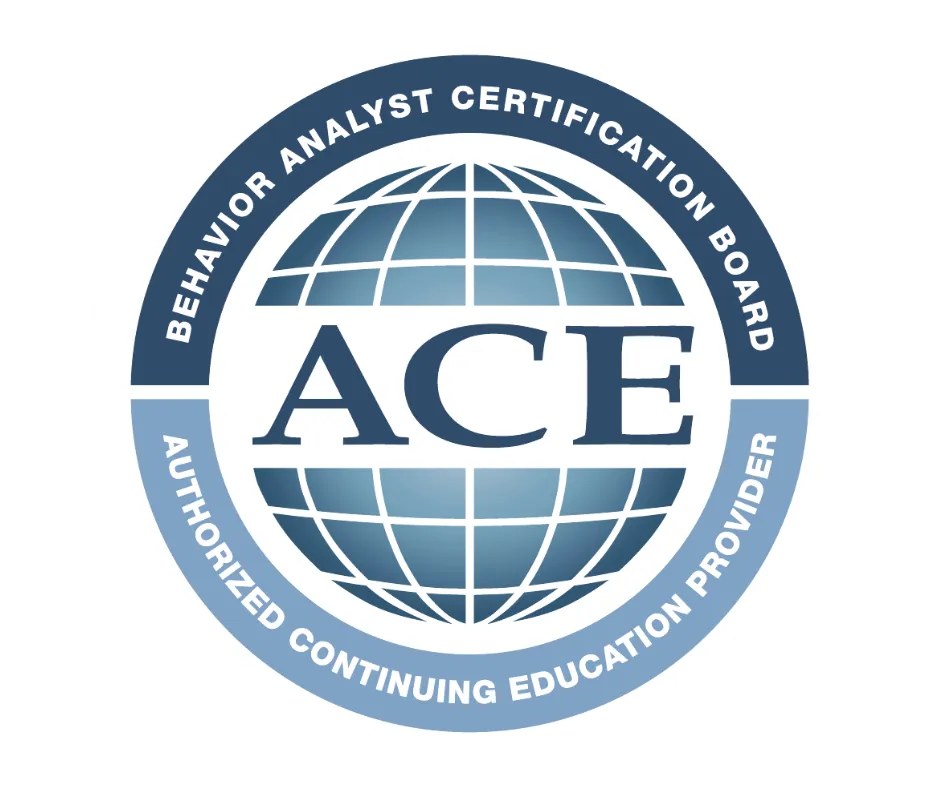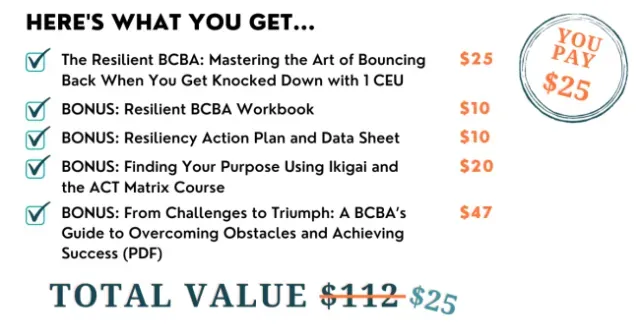1 General Type CEU
The Resilient BCBA®: Mastering the Art of Bouncing Back When You Get Knocked Down
Learn how to come back even stronger!


Instructor: Amelia Dalphonse, MA, BCBA

Amelia Dalphonse, MA, BCBA
Why is The Resilient BCBA® essential to your career as a BCBA®?
A year into services with one of my clients, let’s call him Jacob, Dad was diagnosed with a rare form of cancer and given 3 months to live. I had already helped the family cope with their divorce, now Mom faced new challenges due to another significant change to her son’s routine and suddenly becoming solely responsible for his care.
Dad’s health declined, and Mom felt it was unsafe for her son to be alone with him. Mom needed even more support and often texted at all times of the day.
Dad became physically threatening and she warned us that he might try to come after us to get to his son. Eventually, the court allowed him to observe ABA sessions for 10 minutes per day, so the RBT had to do a video chat with him during sessions. He would sometimes become belligerent, and I told the RBT to just hang up on him if he did.
I felt both sad and relieved when his health declined so much that he couldn’t attend these calls anymore. He lived for over a year.
He passed away on January 1, 2024
Once again, Mom needed support, and I spent time on New Year’s Day helping her create a plan for how to address this with Jacob. Losing a parent is hard on any kid. But a child with autism? Well, you know how even minor disruptions to routine can cause distress. He’d now suffered a third major life change in less than two years..

It was heartbreaking.
And having been up late New Year’s Eve, I wasn’t prepared to deal with this level of emotional need. I try to maintain a level of professional objectivity, to set reasonable boundaries, and protect myself from the damages of compassion fatigue. But we can’t turn our back in their moments of greatest need. I couldn’t say, “I’m sorry for your loss, let’s schedule a meeting for Wednesday.”
She needs me when she needs me. They all do.
It’s never easy, but there are things we can do to help us cope. We can build resilience.
What you will learn:

Identify Your Challenges
Pinpoint the stressors impacting you most as a BCBA®.

Develop Coping Strategies
Learn techniques to manage stress and navigate challenges.

Cultivate Self-Awareness
Understand your emotional responses and triggers.

Transform Challenges
Reframe setbacks as opportunities for growth.

Set Boundaries
Establish healthy boundaries and manage expectations.

Establish a Growth Mindset
Embrace challenges as learning opportunities.
The Problem with Being a BCBA®
This course will not only equip you with the knowledge and skills to implement assent-based practices but also revolutionize the way you approach ABA therapy:

As a BCBA®, you navigate complex human landscapes, often encountering frustration, disappointment, and even anger directed at you. The triumphs can be monumental, a child uttering their first word after months of intervention. But the setbacks, like weeks of regression after hard-won progress, can feel like sucker punches to the gut. Add to this the constant pressure of paperwork, deadlines, and navigating insurance labyrinthine regulations – it’s no wonder the burnout rate among BCBAs® is alarmingly high.
Constant exposure to challenging behaviors: Every day brings unpredictable challenges, from emotional meltdowns to clients resisting interventions. These can chip away at emotional reserves.
The weight of responsibility: Feeling the weight of a child’s development and progress on your shoulders can be immense, generating pressure and anxiety.
Limited emotional support: BCBAs® often work in demanding environments with little time for emotional processing, leading to feelings of isolation and frustration.
But that’s not the end of it—the problem’s actually worse than that!
Witnessing difficult family dynamics: Dealing with complex family situations and conflicting opinions can be emotionally draining and require significant emotional intelligence.
Facing systemic challenges: Navigating insurance paperwork, funding limitations, and bureaucratic hurdles can add to the overall stress and frustration of the job.
Managing the emotional toll of secondary trauma: Witnessing clients’ struggles and empathizing with their families can lead to vicarious trauma, requiring resilience to manage its impact on emotional well-being.

This emotional rollercoaster is why resilience isn’t just a bonus for BCBAs® – it’s a lifeline.
Luckily for you, there’s now a course to support ETHICAL behavior. Introducing The Moral Tightrope:
2 lessons totaling 60 minutes of training with actionable steps you can use right from the start
Discover the secret weapon that keeps high-performing BCBAs® bouncing back from setbacks and thriving in the face of challenge.
Identify the real-world challenges that can trip up even the most dedicated BCBAs® (hint: it’s not just paperwork!).
See how these hurdles can affect your motivation, performance, and even your career path.
Empower yourself with proven techniques to turn obstacles into opportunities and keep your career goals firmly in sight
Craft a personalized resilience action plan that empowers you to proactively address future challenges before they derail your progress.

Trusted ACE Instructors Approved through the BACB
Quality Assurance You Can Trust: All of our instructors are certified Authorized Continuing Education (ACE) providers through the Behavior Analyst Certification Board (BACB). This ensures that our CEU courses meet the rigorous standards set by the BACB and qualify for CEU credits towards maintaining your BCBAs’® certifications.

See what people are saying about The Resilient BCBA®
This CEU provided me with a behavior analytic approach to improving resilience. This is a vital skill/asset to BCBAs® since we work in a field where burn out is common. I look forward to implementing what I have learned very soon. It was a timely training for me and where I am in my career currently.

Theresa R.
I recommend this course for anyone who has been in this field for any period of time. Burnout is real and takes so many away from a much needed service. Please consider this course as a way to create a a BIP for increasing reinforcement for yourself.

Yvonne P.
Act now, and you can get The Resilient BCBA® – plus get these exclusive bonuses!


Meet the Instructor

Amelia Dalphonse, MA, BCBA
Amelia Dalphonse, MA, BCBA, co-founded Master ABA with her twin sister, Dianna Kelly, bringing over 13 years of expertise in Applied Behavior Analysis (ABA). Passionate about prioritizing client needs, Amelia earned a Master’s degree in ABA and became a Board Certified Behavior Analyst (BCBA).
At Master ABA, Amelia and Dianna lead with innovation, emphasizing client-centered care to drive meaningful change. As an ACE provider, they’ve established the institution as a hub for progressive ABA practices, inspiring others to adopt compassionate and ethical approaches.
Through her role at Master ABA, Amelia advocates for advancing the ABA field with empathy and integrity. She stays abreast of the latest research, continuously seeking opportunities for professional growth.
